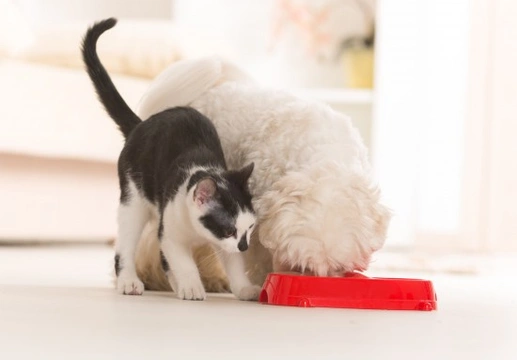
Dogs that eat cat food - Is this really a problem?
Most dog and cat owners know that it is not suitable or appropriate to feed cat food to a dog, or dog food to a cat, but if asked why this is, most people would be unable to answer!
Many dogs seem to have a particular soft spot for cat food, and will take every opportunity to get their paws on it if they can, be this on a one off basis or regularly! But is eating cat food really a problem, and what type of issues can it cause? In this article, we will look at the reasons behind why cat food is unsuitable for dogs, and how to keep your dog out of the cat’s bowl!
Why do some dogs love cat food?
The vast majority of dogs that are not overly picky will accept cat food if it is offered to them, and some dogs will really go out of their way to get hold of it by any possible means! Part of the appeal of cat food for some dogs is the very fact that it is forbidden, and so it takes on the role of a high-value reward to the dog, and denying it to them will simply reinforce their love of it!
Added to this, cats are obligate carnivores, which means that they must eat meat to get all of the essential nutrients that they need; while dogs are omnivorous and can survive without meat, cats fed on a vegetarian diet will fail to thrive and eventually die. This means that cat food contains higher levels of rich protein than dog food, and is very different in its ingredient make up. Cat food is likely more delicious than dog food in terms of taste and ingredients, and if a dog has tried it once, they may well develop the taste for it!
Finally, dogs have a much better sense of smell than cats, which means that in order to entice a cat to eat, the food in question must be much more aromatic and enticing than dog food needs to be to appeal to a dog. Ergo, cat food is more fragrant and scented than dog food, and the presence of cat food and its associated smell can have the same effect on dogs as the smell of our favourite meal cooking can have on people!
What will happen if a dog eats cat food once or occasionally?
The answer to this question largely depends on the size of your dog, and how much cat food they manage to get hold of!
A one-off snack or even a binge might not have any negative effects on your dog, but on the other hand, it might potentially cause problems. The fact that cat food is higher in protein than dog food and also has a different combination of ingredients may mean that it effects the stomach of sensitive dogs, potentially causing an upset stomach and sickness and diarrhoea, although there are unlikely to be any long-term or serious side effects of a one-off cat food binge.
What will happen if a dog eats cat food on a regular basis?
If a dog is fed cat food regularly or manages to gain access to cat food on a regular basis, the chances are that your dog will end up with a sensitive stomach due to finding it hard to digest the heightened protein levels that are present in cat food. Cat food does not contain the appropriate balance of protein to fibre for the dog, and is also lacking in some of the essential nutrients that dogs need to thrive.
Added to this, the protein levels of cat food are higher than dog food, which in a large part leads to the appeal of cat food to dogs, but over time, can have implications for the health of the liver and kidneys of your dog, as they struggle to process protein levels higher than they need.
Cat food is also higher in fat than dog food, which over time, can lead to obesity and weight problems in the dog, and even potentially lead to pancreatitis. This is particularly likely to happen if your dog regularly ingests kitten food, as this is higher in fat and protein than even adult cat food.
How can you prevent your dog eating cat food?
If your dog is obsessed with cat food and never misses a chance to get their paws on it, it can be a challenge to keep them out of the cat’s bowl!
There are a variety of different ways that you can try to stop your dog from being able to get access to the cat’s food, such as feeding the cat on a worktop or higher surface that your dog cannot reach. Making one room out of bounds to the dog and installing a cat flap in it can also keep the cat food well out of reach, as can using baby gates or crates to feed your cat while keeping your dog safely out!



